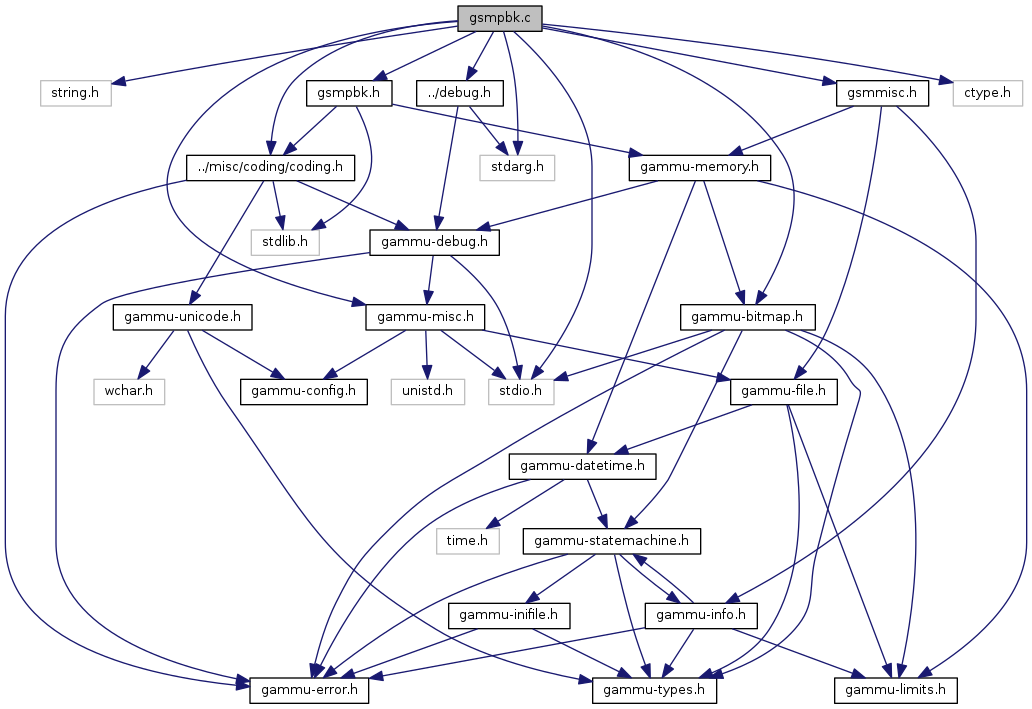#include <string.h>#include <stdio.h>#include <stdarg.h>#include <ctype.h>#include <gammu-misc.h>#include <gammu-bitmap.h>#include "../misc/coding/coding.h"#include "../debug.h"#include "gsmpbk.h"#include "gsmmisc.h"
Go to the source code of this file.
Macros | |
| #define | CHECK_NUM_ENTRIES |
Functions | |
| GSM_MemoryType | GSM_StringToMemoryType (const char *s) |
| unsigned char * | GSM_PhonebookGetEntryName (const GSM_MemoryEntry *entry) |
| void | GSM_PhonebookFindDefaultNameNumberGroup (const GSM_MemoryEntry *entry, int *Name, int *Number, int *Group) |
| GSM_Error | GSM_EncodeVCARD (GSM_Debug_Info *di, char *Buffer, const size_t buff_len, size_t *Length, GSM_MemoryEntry *pbk, const gboolean header, const GSM_VCardVersion Version) |
| void | GSM_TweakInternationalNumber (unsigned char *Number, const GSM_NumberType numType) |
| GSM_Error | GSM_DecodeVCARD (GSM_Debug_Info *di, char *Buffer, size_t *Pos, GSM_MemoryEntry *Pbk, GSM_VCardVersion Version) |
| void | GSM_FreeMemoryEntry (GSM_MemoryEntry *Entry) |
Macro Definition Documentation
§ CHECK_NUM_ENTRIES
| #define CHECK_NUM_ENTRIES |
Definition at line 669 of file gsmpbk.c.
Referenced by GSM_DecodeVCARD().
Function Documentation
§ GSM_FreeMemoryEntry()
| void GSM_FreeMemoryEntry | ( | GSM_MemoryEntry * | Entry | ) |
Frees any dynamically allocated memory inside memory entry structure.
- Parameters
-
[in] Entry Pointer to memory entry to process.
Definition at line 1089 of file gsmpbk.c.
References GSM_BinaryPicture::Buffer, GSM_MemoryEntry::Entries, GSM_MemoryEntry::EntriesNum, GSM_SubMemoryEntry::EntryType, GSM_BinaryPicture::Length, PBK_Photo, and GSM_SubMemoryEntry::Picture.
§ GSM_StringToMemoryType()
| GSM_MemoryType GSM_StringToMemoryType | ( | const char * | s | ) |
Converts memory type from string.
- Parameters
-
s String with memory type.
- Returns
- Parsed memory type or 0 on failure.
Definition at line 16 of file gsmpbk.c.
References MEM_DC, MEM_FD, MEM_MC, MEM_ME, MEM_MT, MEM_ON, MEM_QD, MEM_RC, MEM_SL, MEM_SM, and MEM_VM.
Referenced by GSM_DecodeVCARD().
§ GSM_TweakInternationalNumber()
| void GSM_TweakInternationalNumber | ( | unsigned char * | Number, |
| const GSM_NumberType | numType | ||
| ) |
Definition at line 620 of file gsmpbk.c.
References DecodeUnicodeString(), EncodeUnicode(), and NUMBER_INTERNATIONAL_NUMBERING_PLAN_ISDN.
Referenced by GSM_DecodeVCARD().
